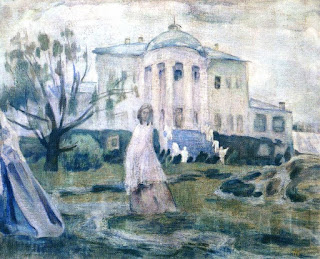Ghosts
Today in the Orthodox calendar we commemorate the Holy Royal Martyrs. This year is the centenary of the murders of Tsar Nicholas and Tsarina Aleksandra, their children Olga, Tatiana, Marie, Anastasia and Alexei, and their faithful servants and friends, at the hands of the atheist Bolshevik revolutionaries. Their brutal ends also marking the end of open religious worship, with the state enforcing a policy of atheism. Mentioning or venerating the Romanov family was banned in print and in public.
I think of the Holy Royal Martyrs often, especially with regard to the way the tide can change so quickly in society.
When I was a child, God was spoken of in the playground, He wasn't ridiculed, we listened in earnest when we had religious education in the classroom. Our country dismantled this outward display of Christianity in half a generation. By the time I was leaving elementary (primary) school, there were no more Christmas carols or religious instruction at state schools. Western culture is so heavily indebted to Christianity for the basis of its law and morality, and we waved it off like a dish we no longer enjoyed eating.
My friends who once attended their own churches with their families – Lutherans, Anglicans, Catholics, Orthodox – uniformly turned away from a life their ancestors had lived for generations as if they were all attune to some Pied Piper who sold Godlessness.
'I am good without God,' they said. And so they all slept in on a Sunday and the sky didn't fall down and so they got on with filling their lives with mantras. Living my best life. Seizing the day. Que sera sera.
Kicking in the foundation of a house just because it seems to have been standing well for a dozen years without you remembering the foundations you laid, is pretty dumb. But that's what has been done. Faith has been that foundation, our moral code, for a healthy society. Without it all we have to look forward to now is decay and degradation, just look at Soviet Russia or Mao's China. Atheism isn't a user-friendly alternative.
***
The Romanov daughters were my role models – they still are, when I remember them. As opposed to the gross materialism of today, they slept on narrow beds above which hung icons, and they wore their simple clothes until threadbare. They were the royal family, yet imagine living that plainly today. I can't go a week without buying myself some kind of treat that I feel I deserve.
The Romanovs were not the coddled, privileged kids of today. Living as a middle-class woman in the 21st century, I have access to a rich life. Maybe we don't live in palaces or go to balls but we have access to premium healthcare, university education, all kinds of entertainment, travel and luxury goods. Do we live our best lives though?
We are in a repeat of early 20th century Russia, when revolutionary fervour swept over the land and turned it inside out. Instead of a communist revolution we are at the beginning of a moral revolution that is blurring the line between left and right, male and female, up and down. For so many, God is dead. Again. Where the Tsar and his family had their lives taken, most of us are too afraid to speak up. Many of us exclude our faith from everyday life when we're out in society, at work and when we go to vote. When that vote brings us closer to that revolution, we remain silent, afraid.
I was in Russia last year, the centenary of the Revolution. I absolutely began to despise the red banners and aggressive text-based art of that era, which was on display at the Russian Museum in Saint Petersburg.
The painting that gripped me was Ghosts by Viktor Borisov-Musatov (below). It is a painting that encapsulates the end of an era – only twelve years later in 1915, the world would see the first version of Kazimir Malevich's abyss, the destruction of The Image, the black square.
Borisov-Musatov "was a great dreamer, oversensitive to the triviality of life... Living in a period of transition [the dawn of the 20th century], he was deeply aggrieved by the contradictions and triteness of contemporary society, and so he took refuge in the remote past, poeticising the images of his golden dreams."
( The Tretyakov Gallery Moscow, Painting. Aurora Art Publishers, Leningrad, 1974).
And I love this work, it pulls at my heart with its female beauty and shimmering colour, like a slipping memory or an impression we got from an old story we loved. Great art will nourish me, but I will also speak up in my tiny way. Who knows who might hear me.



Comments
Post a Comment